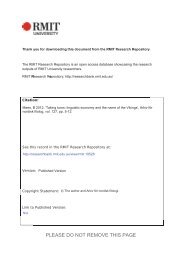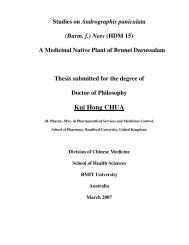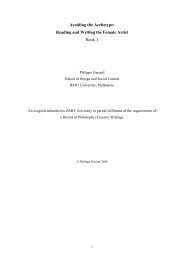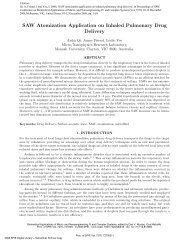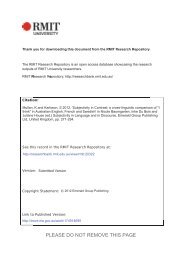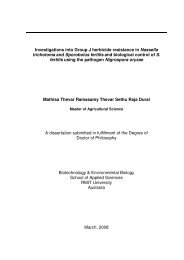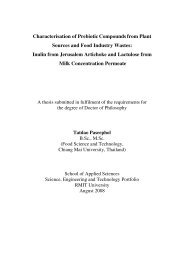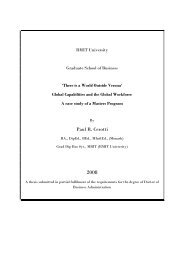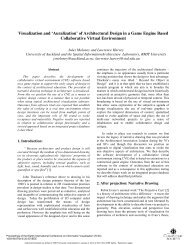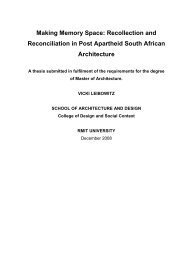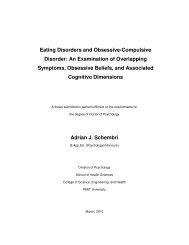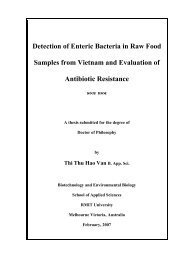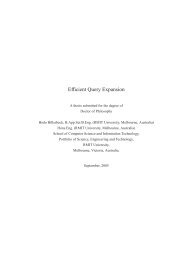Objects in Flux - RMIT Research Repository - RMIT University
Objects in Flux - RMIT Research Repository - RMIT University
Objects in Flux - RMIT Research Repository - RMIT University
You also want an ePaper? Increase the reach of your titles
YUMPU automatically turns print PDFs into web optimized ePapers that Google loves.
uild<strong>in</strong>g walls to prevent climb<strong>in</strong>g – barriers simply become additional<br />
structures to be explored and known.<br />
7.4 Do iPod owners really need social welfare?<br />
To claim that a revolution will spr<strong>in</strong>g from a custom pa<strong>in</strong>ted computer<br />
case seems a little ludicrous, and <strong>in</strong>deed there is a tongue-<strong>in</strong>-cheek<br />
element to many of the projects undertaken dur<strong>in</strong>g this research. The<br />
iPod Social Outreach Program, for <strong>in</strong>stance, raises the question: Do<br />
iPod owners really need a social welfare program? It’s not a question<br />
that has an easy answer.<br />
The consumer practices exam<strong>in</strong>ed <strong>in</strong> this research are not driven by<br />
material or economic need; participants generally possess greater<br />
freedoms, material resources and personal agency than the majority of<br />
the people <strong>in</strong> the world. Given this, it would be easy to dismiss such<br />
practices as the leisure pursuits of a privileged few – as <strong>in</strong>deed they<br />
are. However, consumer culture has arguably become the dom<strong>in</strong>ant<br />
form of existence for a large section of society and the practices exam<strong>in</strong>ed<br />
here appear to play an <strong>in</strong>creas<strong>in</strong>gly important role <strong>in</strong> shap<strong>in</strong>g<br />
this environment. Coupled with this, we have seen that the excesses of<br />
consumer society, ‘the showy products through which a productivist<br />
economy articulates itself’ (Certeau, 1984, p. xvii), br<strong>in</strong>g their own<br />
form of impoverishment and lack. With <strong>in</strong>creas<strong>in</strong>g precision consumers<br />
are positioned as renters, trespassers, even crim<strong>in</strong>als, with<strong>in</strong> their<br />
own material culture.<br />
In Th<strong>in</strong>g Theory Brown asks: ‘If society seems to impose itself on<br />
the “corporeal imag<strong>in</strong>ation,” when and how does that imag<strong>in</strong>ation<br />
struggle aga<strong>in</strong>st the imposition, and what role do th<strong>in</strong>gs, physically<br />
or conceptually, play <strong>in</strong> the struggle? How does the effort to reth<strong>in</strong>k<br />
th<strong>in</strong>gs become an effort to re<strong>in</strong>stitute society?’ (2001, p. 10). Through<br />
dismantl<strong>in</strong>g, repair<strong>in</strong>g, and reconfigur<strong>in</strong>g the products of mass-production,<br />
consumers reth<strong>in</strong>k their relation to the world and <strong>in</strong> do<strong>in</strong>g so<br />
they claim ownership and agency with<strong>in</strong> an alienat<strong>in</strong>g environment.<br />
Practices of consumer production establish a degree of plurality and<br />
creativity with<strong>in</strong> consumer culture. As consumers figure the world <strong>in</strong><br />
new and alternate ways, they make evident the constructed nature of<br />
normative practices of use. Qualities that were positioned as natural<br />
conditions of the object are revealed as commercial strategies manifest<br />
Conclusion<br />
133



